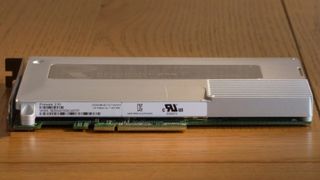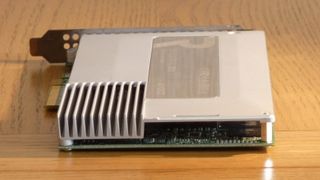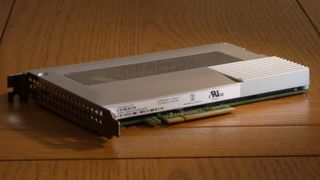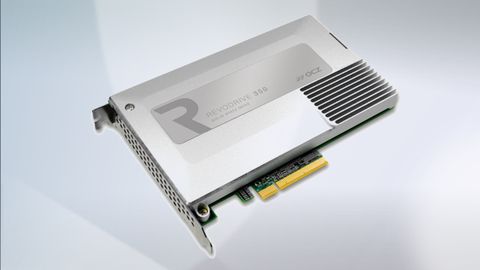Why you can trust TechRadar
As with all storage devices, I ran synthetic benchmarks on the Revodrive 350 to ascertain how well it performed in a variety of situations. As it turns out, the figures OCZ quotes for write speeds aren't typical of every situation.
In Crystal Disk Mark, I measured 1565MB/s sequential read speed, which is just slightly under the claimed speed, but only 882MB/s when writing, vastly less than OCZ's claim. The reason is due to Sandforce controllers handling compressible and incompressible data in different ways. Those faster speeds are attainable sometimes, but most of the time, real-world performance will be far less.

In AS SSD, a quick latency measurement threw up some times that seem a great deal worse than some SATA-based SSDs as well. The write access time of 0.123ms is over three times slower than the 850 Pro at 0.031ms, while the read time of 0.09ms is no better than a fairly inexpensive SSD, and worse than high-end SATA SSD drives. The Samsung 845 Evo manages 0.043ms in this test. But that said, the astonishing IOPS rating is mostly accurate, with 4K QD32 transfer rates of 540MB/s and 483MB/s, which works out as over 138,000 IOPS while reading and 124,000 while writing.
It's when loading a third benchmarking tool, ATTO, that we see OCZ's claims met. This software deals with uncompressed data with a range of file sizes. The graph clearly shows transfer speeds approaching 1800MB/s writing and just under 1400MB/s reading.
In PCMark 08, a better indicator of real-world performance, a score of 4,024 in the conventional test is 100 points higher than the score I recorded with a single Samsung 850 Pro, but 4,958 in the storage test is 100 points lower. This could be explained by the faster RAID 0 IOPS but lower access times.

Cut-throat competition
It's hard to review a graphics editing package without mentioning Photoshop at least once. Tablet reviews inevitably invoke a comparison with the iPad. So with SSDs, it's fair to bring in discussion of Samsung and its fully vertical SSD business.
Samsung's latest SATA 6GB/s SSD, the 850 Pro, is undoubtedly the one to beat, with excellent sequential performance, high IOPS and (on paper, since it's not the easiest thing to verify independently) the best endurance around.
The RevoDrive 350 beats it in many of these tests. But the RevoDrive 350 is an order of magnitude more expensive. You can buy two conventional SSDs and run them in RAID 0 for less money than the RevoDrive 350 costs, enjoying twice the capacity, and in some cases, similar performance. Granted, the traditional SATA RAID 0 method requires two 2.5-inch disk bays in your PC, two sets of SATA cables and two spare 6GB/s SATA ports on your motherboard, while the RevoDrive 350 is far neater.
In my vast book of benchmarks, I have RAID 0 results for a pair of three-bit MLC based Samsung 845 DC Evo SSDs. Sequential read speeds of 1117 MB/s are only 30% slower than the RevoDrive 350, while the write speed of 873 MB/s is almost the same. The Samsung RAID array produced higher write IOPS of 145,000 and read IOPS of 125,000.
Again, all that for significantly less than the cost of the RevoDrive 350, with double the storage capacity too. You'll see vaguely similar results with many modern SATA SSDs paired up and running in RAID 0.

Upgrade issues
There's another issue as well. If you buy a storage device that's stuck to a PCI-Express card, it can only ever be used in a desktop PC. If you upgrade later, you can't pop the old SSD into a laptop, as you might with a SATA drive.
You might look at the fast performance results and think I'm crazy for not falling for the RevoDrive in a big way, but the real issue is that SATA-based SSDs have been falling in price and improving in performance faster than PCI-Express drives have.
The RevoDrive is a custom product, doesn't enjoy large economies of scale, and appeals to a niche section of the market. Its performance is excellent, but these days, the economics of standalone PCI-Express SSDs don't work out as favourably as they did a few years back.

